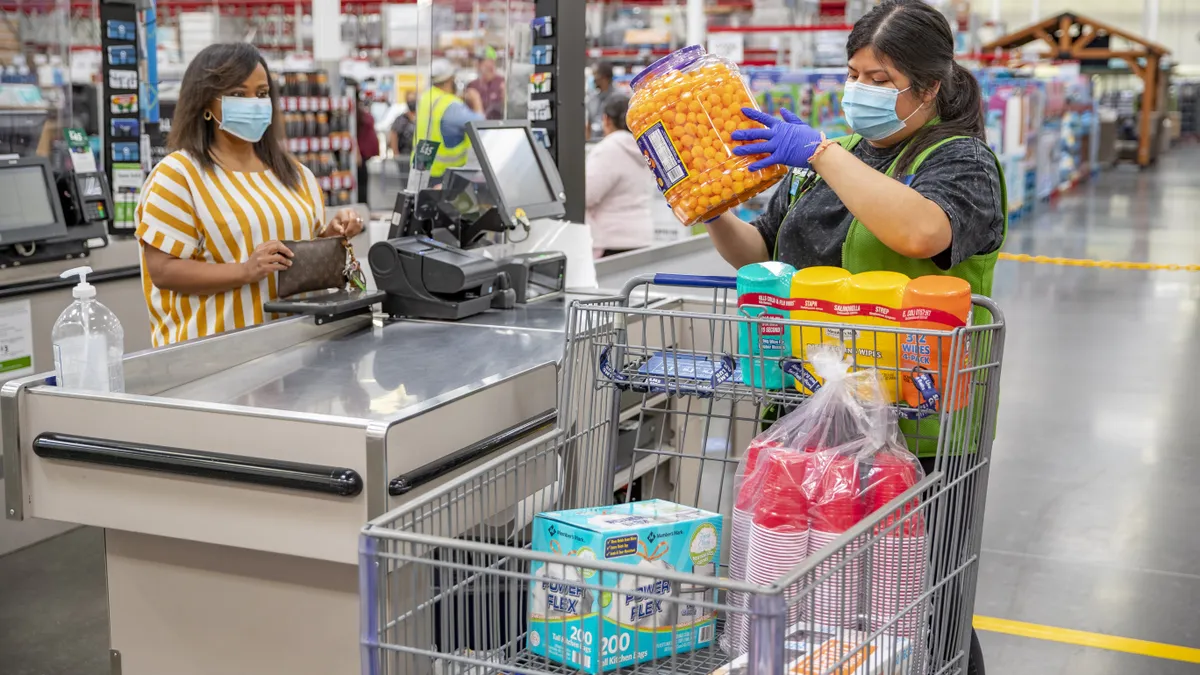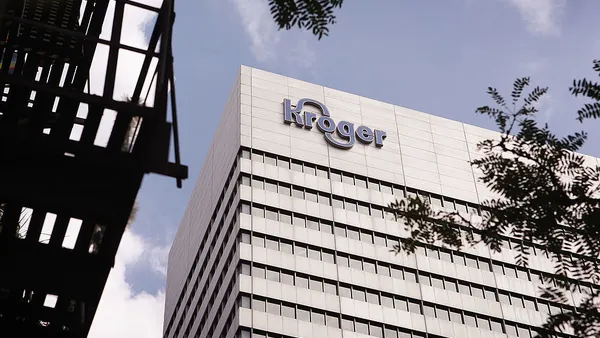Dive Brief:
- Walmart has started requiring associates to wear masks in its stores, Sam's Club membership warehouses, distribution centers and fulfillment centers in counties classified by the federal government as having "substantial" or "high" rates of COVID-19 transmission, the company announced Friday.
- The retailer is also stepping up its efforts to encourage workers to get vaccinated against COVID-19 and has doubled the payment it provides to employees who do so to $150. Certain employees will be required to get shots.
- Walmart's announcements reflect increasingly urgent calls by public health authorities for people to take protective action against rising COVID-19 case counts attributed largely to the aggressive delta variant of the virus.
Dive Insight:
The decision by Walmart to compel many of its employees to wear masks on the job, which reverses its declaration in mid-May that workers could shed face coverings as long as they were fully vaccinated, is a highly visible indication that the pandemic is again clamping down on daily life in the United States.
While Walmart's updated policy does not apply to associates who work in counties where the virus is spreading relatively slowly, as identified by the Centers for Disease Control and Prevention, those portions of the country represent only a minority of the U.S. population. That means that Walmart employees across large swaths of the country — including all of Florida, Louisiana and Arkansas and much of Texas and California — again will have no choice but to cover their faces at work.
The CDC announced last week that people who are vaccinated should cover their faces in public indoor spaces in counties where the virus is spreading at above a "moderate" pace.
Perhaps even more noteworthy than Walmart's decision to resume face masks requirements in many of its stores and other facilities is its announcement that it will require some of its employees to get vaccinated by Oct. 4 and press harder to get the balance of its workforce to follow suit voluntarily.
The retailer is positioning its vaccine mandate, which will apply to people assigned to Walmart's corporate offices as well as to market, regional and divisional associates who work in multiple facilities operated by the company, as a way to demonstrate to its full workforce the benefits of getting inoculated against COVID-19.
"Throughout the pandemic we have focused on the health and well-being of our associates. We believe we have an important role to play and believe the requirement for vaccinations for our leaders is key to driving toward an end to this pandemic. Let's set the example," Walmart President and CEO Doug McMillon wrote in a memo the company posted on its website Friday.
Walmart is also stressing to employees not covered by the vaccine requirement — the majority of its workforce — that it wants them to get inoculated. Workers will receive a $150 bonus for getting vaccinated, can get shots at its in-store pharmacies without an appointment, and don't have to take time off to take care of the procedure, Donna Morris, Walmart's chief people officer, and the company's executive vice president of health and wellness, Dr. Cheryl Pegus, wrote in a memo posted on Walmart's website on Friday.
"We know vaccinations are our solution to drive change. We are urging you to get vaccinated and want to see many more of you vaccinated," Morris and Pegus said.
While Walmart is ahead of other retailers in announcing that it has made changes to its vaccine and mask policies, it is not alone in responding to the CDC's latest guidance. For example, Publix's website now indicates that the Florida-based retailer's associates must wear masks in its facilities regardless of whether they are vaccinated or not. In addition, Kroger suggested that it, too, might be considering changes to its policies, issuing a statement on Friday reiterating that it "strongly encourages" people who enter its stores and facilities to wear masks in its stores and facilities.
Just 46% of Kroger employees have let the retailer know of their vaccination status, The Wall Street Journal reported Friday.














